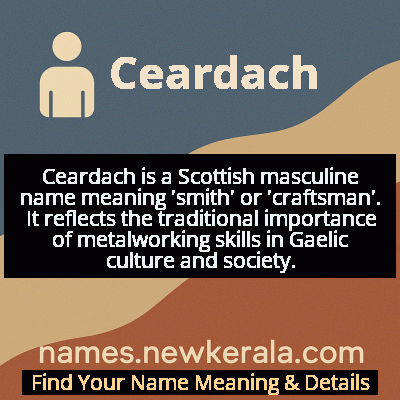Ceardach Name Meaning & Details
Origin, Popularity, Numerology Analysis & Name Meaning of Ceardach
Discover the origin, meaning, and cultural significance of the name CEARDACH. Delve into its historical roots and explore the lasting impact it has had on communities and traditions.
Name
Ceardach
Gender
Male
Origin
Scottish
Lucky Number
7
Meaning of the Name - Ceardach
Ceardach is a Scottish masculine name meaning 'smith' or 'craftsman'. It reflects the traditional importance of metalworking skills in Gaelic culture and society.
Ceardach - Complete Numerology Analysis
Your Numerology Number
Based on Pythagorean Numerology System
Ruling Planet
Neptune (Ketu)
Positive Nature
Intuitive, analytical, spiritual, and inquisitive.
Negative Traits
Secretive, reserved, aloof, and can be overly critical.
Lucky Colours
Green, yellow.
Lucky Days
Monday.
Lucky Stones
Cat’s eye, moonstone.
Harmony Numbers
1, 5, 6.
Best Suited Professions
Scientists, researchers, spiritual leaders, detectives.
What People Like About You
Depth of knowledge, analytical skills, spirituality.
Famous People Named Ceardach
Ceardach MacGriogair
Clan metalsmith
Renowned Highland blacksmith who crafted weapons for Clan Gregor during the Jacobite uprisings
Ceardach Ó Broin
Historical chronicler
Recorded Gaelic traditions and metalworking techniques in early Scottish manuscripts
Ceardach MacAoidh
Architectural metalsmith
Created intricate ironwork for Scottish castles and cathedrals, including Stirling Castle gates
Ceardach MacDhòmhnaill
Clan craftsman
Master armorer to Clan Donald, known for crafting distinctive Highland broadswords
Name Variations & International Equivalents
Click on blue names to explore their detailed meanings. Gray names with will be available soon.
Cultural & Historical Significance
The name embodies the Celtic reverence for craftsmanship and the belief that creating functional beauty from raw materials was a sacred act connecting the physical and spiritual worlds. In many Gaelic communities, the local smith held a position similar to a shaman or wise person, believed to possess knowledge that bridged the mundane and mystical realms. This cultural context gives the name Ceardach layers of meaning beyond mere occupation—it represents tradition, community service, and the preservation of ancient skills that defined Highland life for centuries.
Extended Personality Analysis
Individuals named Ceardach are typically perceived as practical, resourceful, and deeply connected to traditional values. They often exhibit the patience and precision associated with their namesake craft, approaching problems with methodical care and attention to detail. Like the smith transforming raw metal into useful objects, Ceardachs tend to be problem-solvers who enjoy creating order from chaos and finding practical solutions to complex challenges. Their personality often combines strength with creativity—they're both grounded in reality and capable of innovative thinking.
This balance makes them reliable in crises while maintaining the vision to see potential where others see only raw materials. They typically value skill, competence, and tangible results over abstract theories, preferring action to speculation. In social contexts, Ceardachs are often seen as the 'backbone' of their communities—dependable, hardworking, and committed to quality in everything they do. While they may not seek the spotlight, they earn respect through consistent performance and mastery of their chosen fields. Their approach to life reflects the smith's philosophy: that through disciplined effort and careful craftsmanship, one can shape both materials and circumstances to serve meaningful purposes.
Modern Usage & Popularity
In contemporary times, Ceardach remains a relatively rare but culturally significant name, primarily used within Scottish Gaelic-speaking communities and by families seeking to honor their Celtic heritage. While not appearing on mainstream popularity charts, it has experienced a modest revival as part of the broader Celtic cultural renaissance. The name is most commonly found in Scotland, particularly in the Highlands and Islands, with some usage in Scottish diaspora communities in Canada, the United States, and Australia. Modern parents choosing this name often value its strong connection to Scottish tradition, its unique sound, and the positive attributes associated with craftsmanship and skill. It's considered a distinctive choice that reflects pride in Gaelic cultural identity while avoiding the trendiness of more common Celtic names, making it appealing to parents seeking something authentic yet uncommon.
Symbolic & Spiritual Meanings
Symbolically, Ceardach represents transformation, utility, and the marriage of strength with creativity. Like the smith's forge that turns raw ore into functional tools, the name embodies the concept of purposeful transformation—the ability to shape raw potential into practical reality. It symbolizes the bridge between nature and civilization, representing human ingenuity in harnessing natural elements for communal benefit. The name also carries connotations of reliability and endurance, much like well-crafted metalwork that withstands the test of time. In metaphorical terms, Ceardach suggests someone who can 'forge their own destiny' through skill and determination, creating their path rather than following conventional routes. The symbolic resonance extends to concepts of tempering—the idea that challenges, like the smith's hammer and fire, strengthen character and refine personal qualities.

